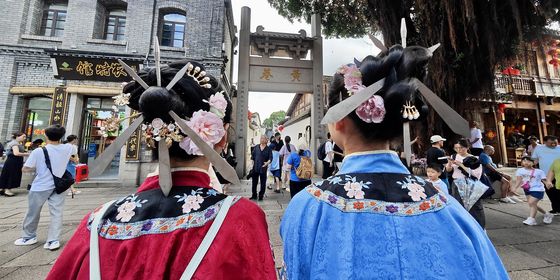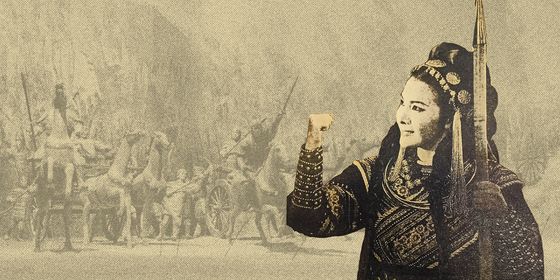It’s not just D&G: here are some other foreign brands that have failed to impress Chinese consumers
“You don’t love China, you love money,” wrote French-Chinese model Estelle Chen on Instagram, calling on Chinese consumers to boycott luxury fashion brand Dolce & Gabbana, after its “DG Loves China” videos, posted last week to promote an upcoming fashion show in Shanghai, became notorious for their caricatures of local culture, a scandal that escalated following a series of ill-advised Instagram messages by one of D&G’s founders.
Retribution has been swift for the Italian fashion house, which draws about a third of its annual sales from the Greater China region. Already, its Shanghai show has been cancelled, its products taken off major Chinese e-commerce sites, and brand ambassadors, including TFBoys’ Karry Wang and actress Dilraba Dilmurat, have terminated their association with the company. The hashtag “DG insults China” had been viewed over 600 million times on Weibo at the time of writing.
This is far from the first time that a foreign brand’s attempts to appeal to the Chinese market has ended up mired in Orientalist tropes, and backfiring (it’s not even the first for D&G, which caused a minor uproar in 2017 with ads that showed glammed-up models posing next to Beijingers in shabby hutongs and rickshaws; and another, in 2016, for outfitting models with qipao and cameras to represent “Chinese tourists”).
While racial stereotyping and “yellowface” date back to the early days of Hollywood history, social media has made it easier to spread the backlash—as can be seen in this list of other recent gaffes that stirred up strong reactions from Chinese consumers, proving that brands still need to learn from past mistakes and public opinion (or hire new PR consultants).
1. Takeout fashion
In 2016, luxury brand Dior caught heavy criticism for a series of monkey-inspired red necklaces created in honor of the Year of the Monkey, which did not look remotely Chinese or anything else. That wasn’t even the biggest fashion flop of the year, though. That dubious honor goes to Kate Spade’s Chinese takeaway handbag. Many denounced the bag for being tacky and tone-deaf, as these takeout containers are actually associated with American-Chinese restaurants and often used to stereotype the communities that run them.
2. Model mishaps
In September 2017, supermodel Gigi Hadid found herself in the midst of an online hate-storm, after a video showed her squinting, apparently while trying to imitate a Buddha statue. Chinese netizens made it clear that Hadid was not welcome at the annual Victoria’s Secret show in Shanghai in 2017: “What you have done made us unhappy. And Chinese do not welcome you.” Hadid was eventually denied a Chinese visa to participate, though officials never confirmed a link between the events.
Victoria’s Secret had been embroiled in another scandal the previous year, when models at their Paris show donned giant dragons, phoenix wings, and other Orientalist accessories on the runway. The outfits were denounced as ugly and culturally insensitive, especially by pairing sacred elements like the dragon with lingerie.
3. Leaving your mark
One must not forget the time when, in 2012, Ferrari drove a vehicle on a section of Nanjing’s Ming-era city walls, leaving tire marks on the 600-year-old monument. Afterwards, city officials claimed that Ferrari had not been approved for such an extravagant stunt, and the luxury car manufacturer was forced to issue an official apology to the government (which put all the blame on a local dealership employee).
Speaking of ancient monuments, many netizens were irritated when Airbnb announced a contest to win an overnight stay in a converted watchtower of Beijing’s Great Wall in August. “So now even ancient relics can be rented to guests for a profit?” one Weibo user asked. Even though Airbnb declared that the aim of the contest was to encourage conservation awareness, the promotion was cancelled after the Beijing Cultural Commission said it was never formally approved.
4. Distasteful design
Wearing t-shirts with ironic, borderline ridiculous prints can be a fashion statement (think: “I don’t wanna taco ’bout it”). However, many felt that German online boutique Spreadshirt had taken it too far in 2017, selling T-shirts with slogans such as “Save a dog, eat a Chinese” or “Save a shark, eat a Chinese.” Netizen lashed out at this for adhering to racist stereotypes, with one user writing on the store’s Facebook page, “Is this really necessary?? Does your company need money that bad that you need to piss off the entire Asian community just [to] make a few bucks?” The Chinese embassy in Germany demanded an apology, and the offending shirts were eventually removed from the Spreadshirt website.
5. Whitewashing wrath
Some positive news, finally: When Disney announced it was creating a live-action remake of its iconic 1998 animated film, Mulan, a script calling for a white actor in a major supporting role began circulating on social media. Fans created an online petition, which obtained over 112,000 signatures, urging Disney not to “whitewash” yet another Asian role in Hollywood. When Disney announced it was casting Chinese actress Crystal Liu (刘亦菲, Liu Yifei) in the title role of Hua Mulan (whose story comes from a ballad from the Northern Wei dynasty), many fans breathed a sigh of relief.
Correction: An earlier version of this post erroneously stated that Disney called for a white actor in the starring role in Mulan











